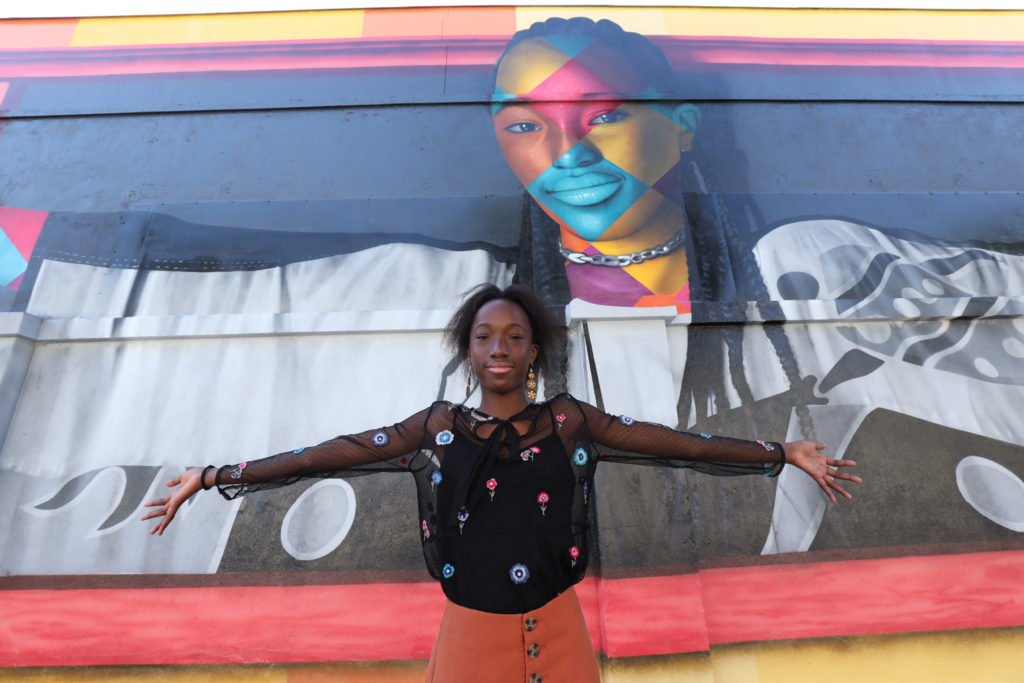São Paulo – A wall in front of São Paulo state’s Immigration Museum was transformed into windows with eight characters from different backgrounds to celebrate the diversity of migrants and refugees in Brazil. The newest work by artist Eduardo Kobra is the 736-square-meter mural ‘Windows Open to the World’ [‘Janelas Abertas para o Mundo’], located in the Mooca neighborhood on the east side of São Paulo city. Among the real people portrayed in the vibrant colors that are the artist’s signature, three are Arabs from Libya, Palestine, and Iraq. The others are from Venezuela, Angola (2), and India (2).
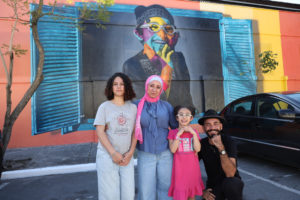
Along the 5.8 meters high 127-meter-long mural, in painted windows, are portrayed Noura Bader, 35 years old (Palestine); Priscília Mbuku Bazonga, 12 (Libya); Seema Bashar Hameed Aluqla, 8 (Iraq); Andres Samuel Peralta Guedez, 15 (Venezuela); Mafueni Delfina, 9, and Mabanza Victor James Henoe, 6 (Angola); Vijay Bavaskar, 52, and Deepali Bavaskar, 49 (India). Kobra spoke with each refugee to learn about their stories and personalities.
The muralist highlighted the importance of hospitality. “It is necessary to open the windows, but also the doors, eyes, and hearts to welcome these people who resigned their homelands and needed, for many reasons, to move. May they be happy and able to rebuild their lives on Brazilian soil,” said Kobra in a statement.
The building, now a museum, was originally an inn that received migrants, many refugees, who often stood at their windows watching the new city. Now, visitors in the gardens of the Museum of Immigration can see the windows of the mural and maybe, become interested in the stories of the people portrayed and the issue of the millions of refugees worldwide.
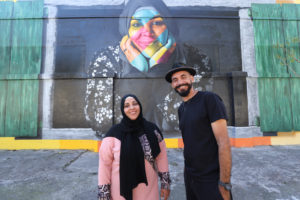
“Symbolically, a wall is a barrier, something we don’t need in the world. It separates, determines differences, and prevents coming and going. That’s why I chose to show the characters in the open windows, looking out at the people passing by, often indifferently,” said the artist.
According to Kobra, indifference is as harmful as hatred and prejudice against migrants and refugees. “More than ever, the colors I use in my works have a very special meaning here. People, with their diverse origins, cultures, and characteristics, make the country – and the world! – more beautiful.”
The Arab characters
The young Priscília (pictured above), born in Libya, is one of the characters in the mural. She and her family moved to Congo due to war but soon sought refuge in another country due to political unrest. They arrived in Brazil in 2014. With the support of a humanitarian organization, they started a Portuguese course and were housed in an inn. The possibility of living in peace is a positive aspect mentioned by Priscília’s mother, Mamie, who also remembered how sad it was to start all over again, away from her family, loved ones, and former job. The young Libyan highlighted what she likes most when she sees herself on the mural is the fact of “having open arms.” “It’s like I’m hugging people. And that’s exactly what I want: For everyone who looks at this painting to feel embraced,” said Priscília.
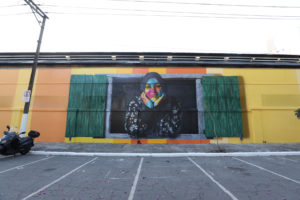
After getting married, at the age of 21, Palestinian Noura, born in Gaza, moved with her husband to Saudi Arabia. Due to their origin, they were unable to obtain documentation or work and were prevented from returning to their home country due to the closing of borders. When they received an invitation from a friend who lived in Brazil, they did not think twice about moving to another continent and country, with their two children, in 2016. In a few years, they gained Brazilian citizenship, and it was in the South American country Noura had her third child.
Seema is an Iraqi born in Jordan, just like her three brothers, and it was there her family moved due to the war. She has been in Brazil for four years and has already suffered many challenges in her eight years of life, but she opens an ear-to-ear spontaneous smile and makes others believe life is good and worthwhile. She was delighted with the expression on her face captured by Kobra: “My smile turned out really nice. I loved it. It is important even if something is difficult or bothering us, we never take the smile off our face,” said Seema.
Production
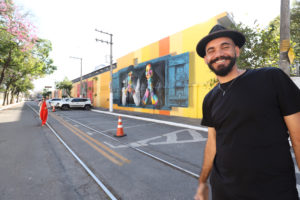
To carry out the work, Kobra counted on the partnership of the humanitarian organization I Know My Rights (IKMR), which indicated the portrayed immigrants. By the end of September, Kobra will make an exclusive art piece with the mural’s image. All proceeds from the sale in an online auction will be donated to IKMR. The auction date is not yet determined.
The mural has the support of São Paulo state train company CPTM and sponsorship, through the Brazilian Federal Law of Culture Incentive, of health and hospital services company Rede D’Or. The Immigration Museum – an institution of the Culture and Creative Economy Secretariat of the State of São Paulo – is located at Rua Visconde de Parnaíba, 1316, Mooca, São Paulo – SP.
Translated by Elúsio Brasileiro



